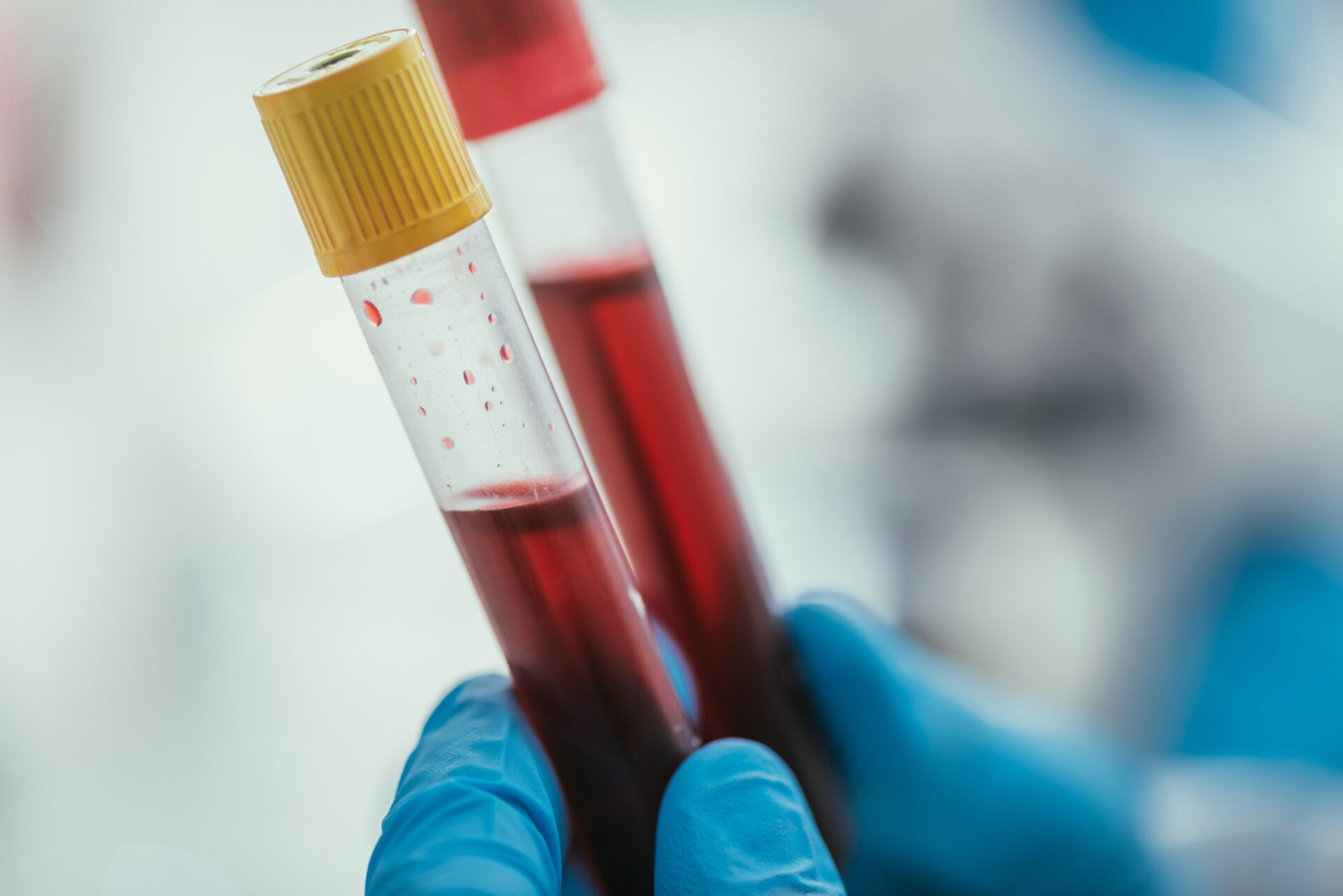294/1 Asia Building (11th Floor), Phyathai, Bangkok
SYPHILIS

What is syphilis?
Syphilis is a sexually transmitted infection that can cause serious health problems if it is not treated. Syphilis is divided into stages (primary, secondary, latent, and tertiary). There are different signs and symptoms associated with each stage.
How is syphilis spread?
You can get syphilis by direct contact with a syphilis sore during vaginal, anal, or oral sex. You can find sores on or around the penis, vagina, or anus, or in the rectum, on the lips, or in the mouth. Syphilis can spread from an infected mother to her unborn baby.
Am I at risk for syphilis?
Any sexually active person can get syphilis through unprotected vaginal, anal, or oral sex. Have an honest and open talk with your health care provider and ask whether you should be tested for syphilis or other STDs.
- All pregnant women should be tested for syphilis at their first prenatal visit.
- You should get tested regularly for syphilis if you are sexually active and
- are a man who has sex with men;
- are living with HIV; or
- have partner(s) who have tested positive for syphilis.
I’m pregnant. How does syphilis affect my baby?
If you are pregnant and have syphilis, you can give the infection to your unborn baby. Having syphilis can lead to a low birth weight baby. It can also make it more likely you will deliver your baby too early or stillborn (a baby born dead). To protect your baby, you should be tested for syphilis at least once during your pregnancy. Receive immediate treatment if you test positive. An infected baby may be born without signs or symptoms of disease. However, if not treated immediately, the baby may develop serious problems within a few weeks. Untreated babies can have health problems such as cataracts, deafness, or seizures, and can die.
What are the signs and symptoms of syphilis?
Primary Stage
During the first (primary) stage of syphilis, you may notice a single sore or multiple sores. The sore is the location where syphilis entered your body. Sores are usually (but not always) firm, round, and painless. Because the sore is painless, it can easily go unnoticed. The sore usually lasts 3 to 6 weeks and heals regardless of whether or not you receive treatment. Even after the sore goes away, you must still receive treatment. This will stop your infection from moving to the secondary stage.
Secondary Stage
During the secondary stage, you may have skin rashes and/or mucous membrane lesions. Mucous membrane lesions are sores in your mouth, vagina, or anus. This stage usually starts with a rash on one or more areas of your body. The rash can show up when your primary sore is healing or several weeks after the sore has healed. The rash can look like rough, red, or reddish brown spots on the palms of your hands and/or the bottoms of your feet. The rash usually won’t itch and it is sometimes so faint that you won’t notice it. Other symptoms you may have can include fever, swollen lymph glands, sore throat, patchy hair loss, headaches, weight loss, muscle aches, and fatigue (feeling very tired). The symptoms from this stage will go away whether or not you receive treatment. Without the right treatment, your infection will move to the latent and possibly tertiary stages of syphilis.
Latent Stage
The latent stage of syphilis is a period of time when there are no visible signs or symptoms of syphilis. If you do not receive treatment, you can continue to have syphilis in your body for years without any signs or symptoms.
Tertiary Stage
Most people with untreated syphilis do not develop tertiary syphilis. However, when it does happen it can affect many different organ systems. These include the heart and blood vessels, and the brain and nervous system. Tertiary syphilis is very serious and would occur 10–30 years after your infection began. In tertiary syphilis, the disease damages your internal organs and can result in death.
Neurosyphilis and Ocular Syphilis
Without treatment, syphilis can spread to the brain and nervous system (neurosyphilis) or to the eye (ocular syphilis). This can happen during any of the stages described above.
Symptoms of neurosyphilis include
- severe headache;
- difficulty coordinating muscle movements;
- paralysis (not able to move certain parts of your body);
- numbness; and
- dementia (mental disorder).
Symptoms of ocular syphilis include changes in your vision and even blindness.
How will I or my doctor know if I have syphilis?
Most of the time, a blood test is used to test for syphilis. Some health care providers will diagnose syphilis by testing fluid from a syphilis sore.
Accordion Content
Can syphilis be cured?
Yes, syphilis can be cured with the right antibiotics from your health care provider. However, treatment might not undo any damage that the infection has already done.
I’ve been treated. Can I get syphilis again?
Having syphilis once does not protect you from getting it again. Even after you’ve been successfully treated, you can still be re-infected. Only laboratory tests can confirm whether you have syphilis. Follow-up testing by your health care provider is recommended to make sure that your treatment was successful.
It may not be obvious that a sex partner has syphilis. This is because syphilis sores can be hidden in the vagina, anus, under the foreskin of the penis, or in the mouth. Unless you know that your sex partner(s) has been tested and treated, you may be at risk of getting syphilis again from an infected sex partner.
Reference : https://www.cdc.gov/std/syphilis/stdfact-syphilis.htm
Make Appointment





Relate content :

Your Guide to Sexual Health Clinics: Everything You Need to Know
Are you seeking information about sexual health clinics? Whether you're looking for routine check-ups, specific treatments, or simply want to learn more about your sexual health, this blog post is here to guide you. We'll discuss what sexual health clinics are, how to choose the right one, and provide a spotlight on sexual health clinics…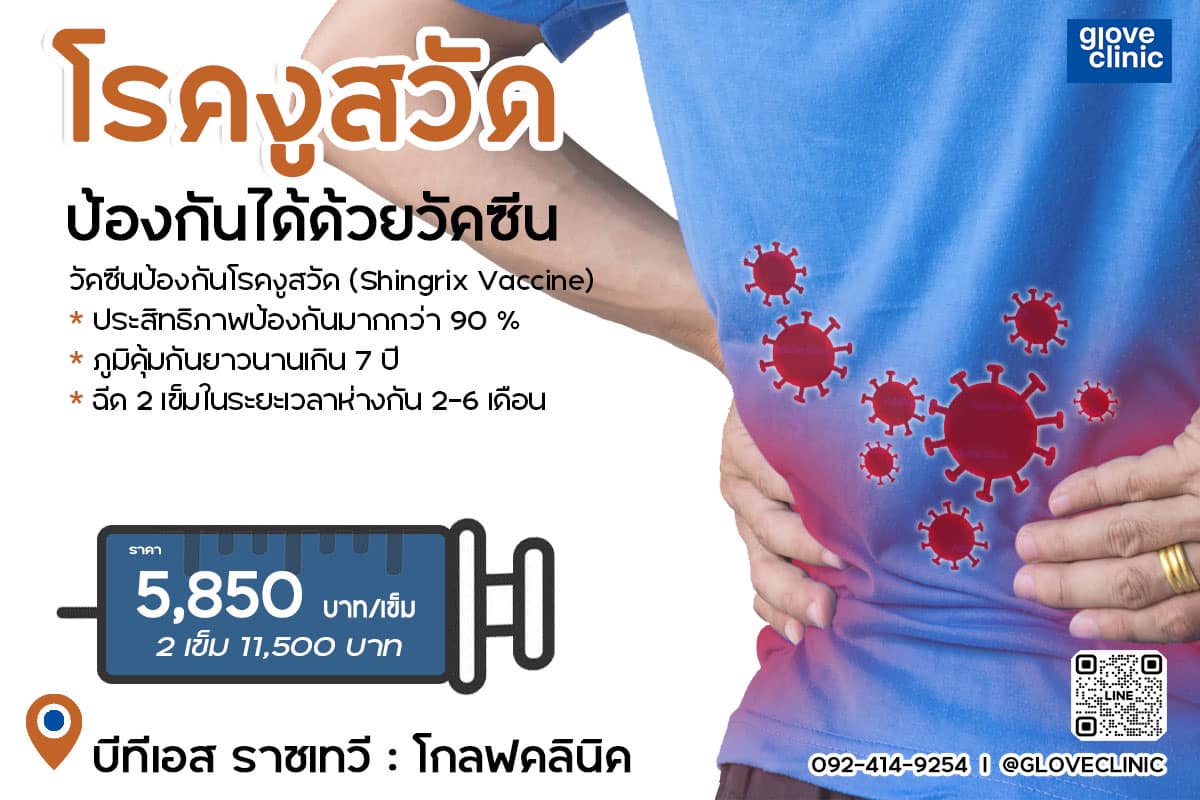
ฉีดวัคซีนงูสวัดที่ glove clinic
งูสวัดคือไวรัสชนิดหนึ่ง (Herpes zoster) ซึ่งเป็นเชื้อไวรัสตัวเดียวกันกับอีสุกอีใส (Varicella zoster) เมื่อเราติดเชื้อไวรัสอีสุกใสในวัยเด็กแล้ว ไวรัสสามารถที่จะหลบซ่อนได้ในร่างกายเป็นเวลานานหลายปี จนกระทั่งเมื่อร่างกายอ่อนแอ ไวรัสนั้นจึงออกมาทำให้เกิดอาการตุ่มน้ำใส ปวดแสบร้อนตามบริเวณที่เส้นประสาทต่าง ๆ ของร่างกายซึ่งเรียกกันว่างูสวัด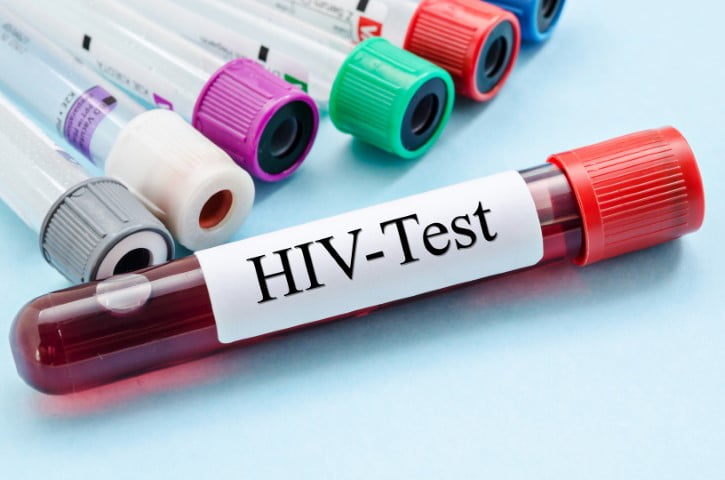
ตรวจ HIV รีวิวความรู้สำหรับการตรวจเอชไอวี (HIV test)
เอชไอวีคือไวรัสที่สามารถติดต่อได้จากการมีเพศสัมพันธ์, การใช้เข็มฉีดยาร่วมกัน, และการติดจากแม่สู่ลูก เมื่อติดเชื้อไวรัส HIV ไวรัสจะทำให้ภูมิคุ้มกันของร่างกายอ่อนแอลง และติดเชื้อโรคอื่น ๆ ได้ง่าย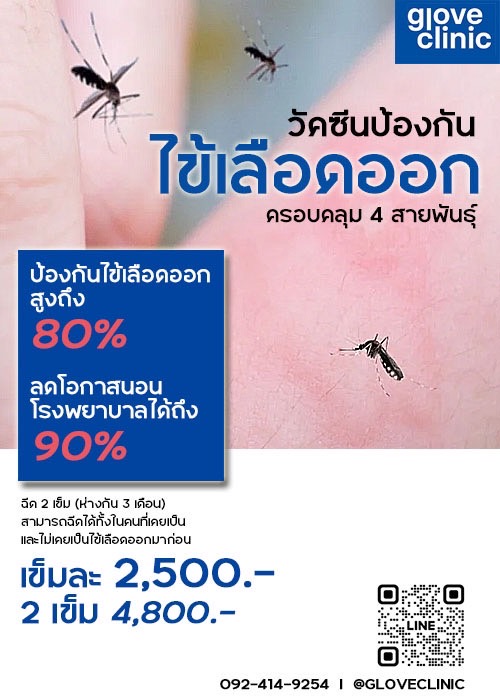
ปีนี้มีคนไข้ป่วยด้วยไข้เลือดออกมากกว่า 2-3 ปีที่ผ่านมา
เนื่องจากว่าผู้คนกลับมาใช้ชีวิตปกติ มีการเดินทาง จึงพบการระบาดมากขึ้น โดยจากสถิติของกรมควบคุมโรคพบว่ามีผู้ป่วยด้วยไข้เลือดออกในประเทศไทยเกินกว่า 60,000 รายไปแล้วทั้งปี 2566 ไข้เลือดออกเป็นโรคที่ก่อให้เกิดความรุนแรงได้ทั้งในเด็กและผู้ใหญ่ โดยเฉพาะอย่างยิ่งในคนที่เป็นซ้ำครั้งที่ 2 จะมีโอกาสเกิดภาวะช๊อคและเสียชีวิตได้มากขึ้น (โอกาสเสียชีวิตอยู่ราว ๆ 1:1,000) วัคซีนไข้เลือดออกรุ่นใหม่สามารถครอบคลุมได้ทั้ง 4 สายพันธุ์และทั้งนี้ผลการศึกษาพบว่าช่วยป้องกันการติดเชื้อได้ถึง 80% และลดโอกาสการนอนโรงพยาบาลได้ถึง 90% นอกจากนี้ยังสามารถฉีดได้ทั้งในคนที่เคยและไม่เคยเป็นไข้เลือดออกมาก่อน (วัคซีนไข้เลือดออกรุ่นเก่าไม่ควรฉีดในคนที่ยังไม่เคยเป็นไข้เลือดออก) สอบถามข้อมูลเพิ่มเติมเรื่องวัคซีนไข้เลือดออกได้ที่ 092-414-9254, Line Official @gloveclinic (มีแอดข้างหน้า)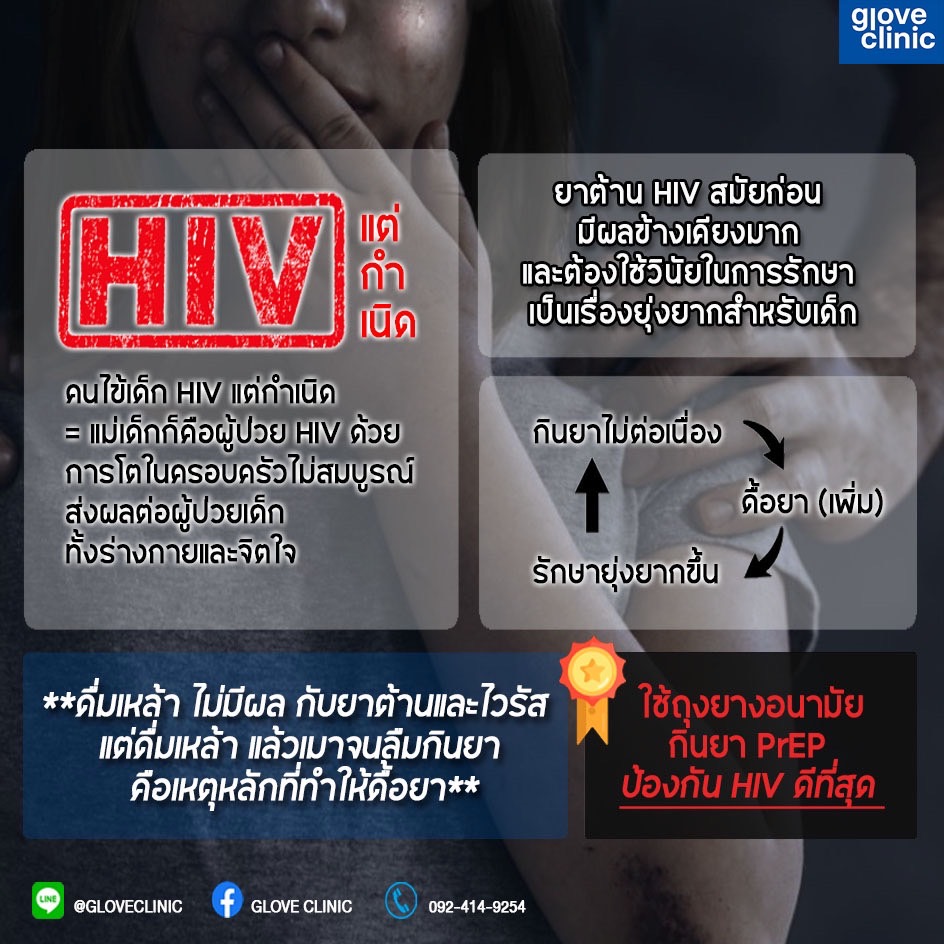
HIV แต่กำเนิด
ประเด็นร้อนที่ได้รับการพูดถึงอย่างมากในโลกออนไลน์ที่มีข้อความของนักศึกษาหญิงเปิดเผยว่าตัวเธอเองได้มีเพศสัมพันธ์แบบ one night stand เวลาไปเที่ยวกลางคืนบ่อยครั้ง และได้บอกความจริงว่าเธอเองมีเชื้อ HIV